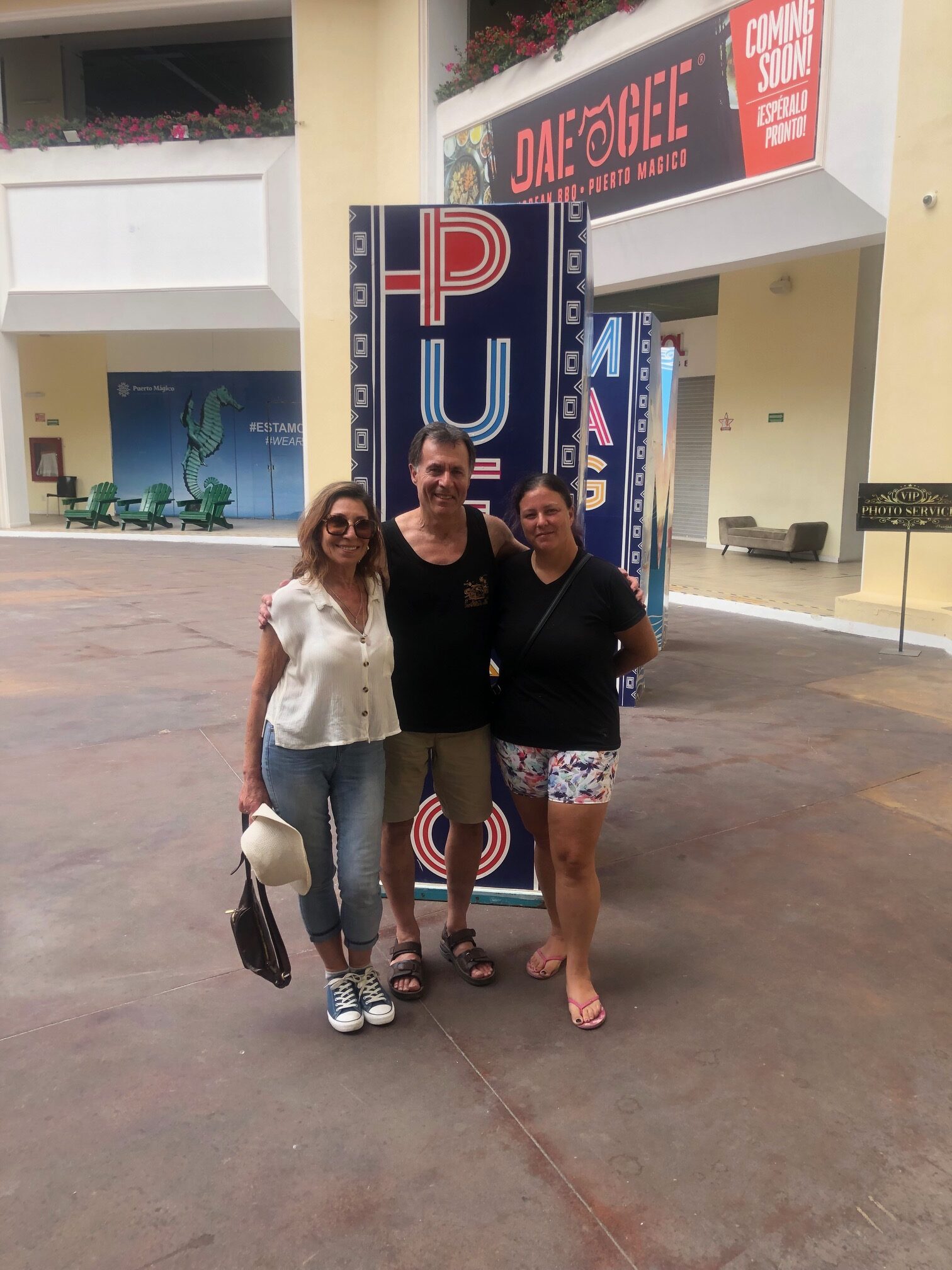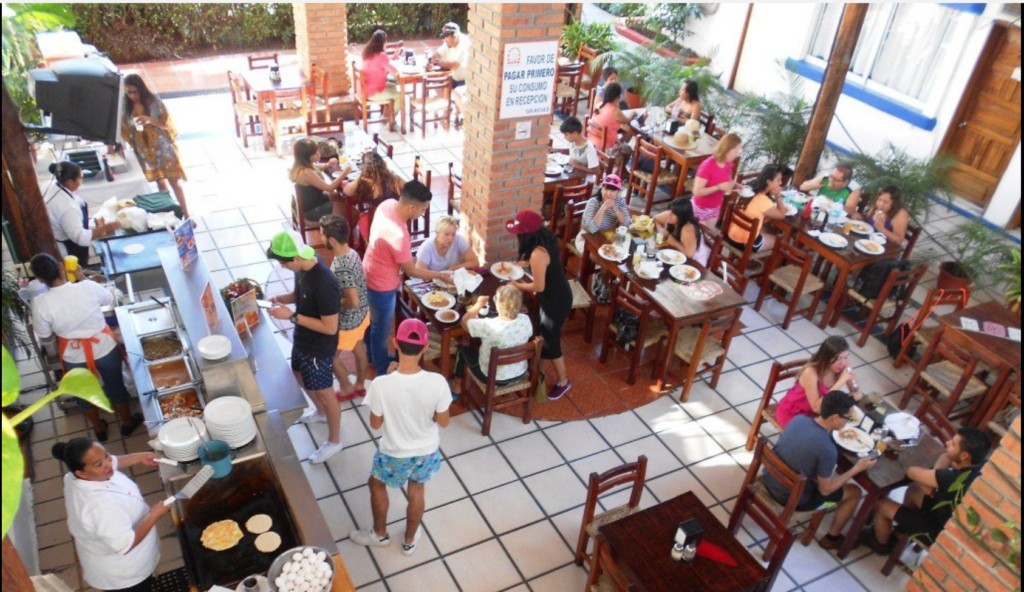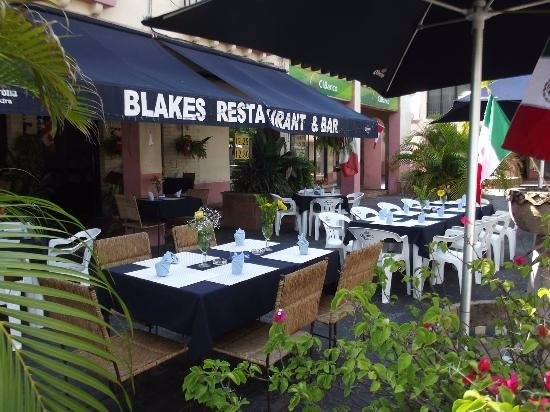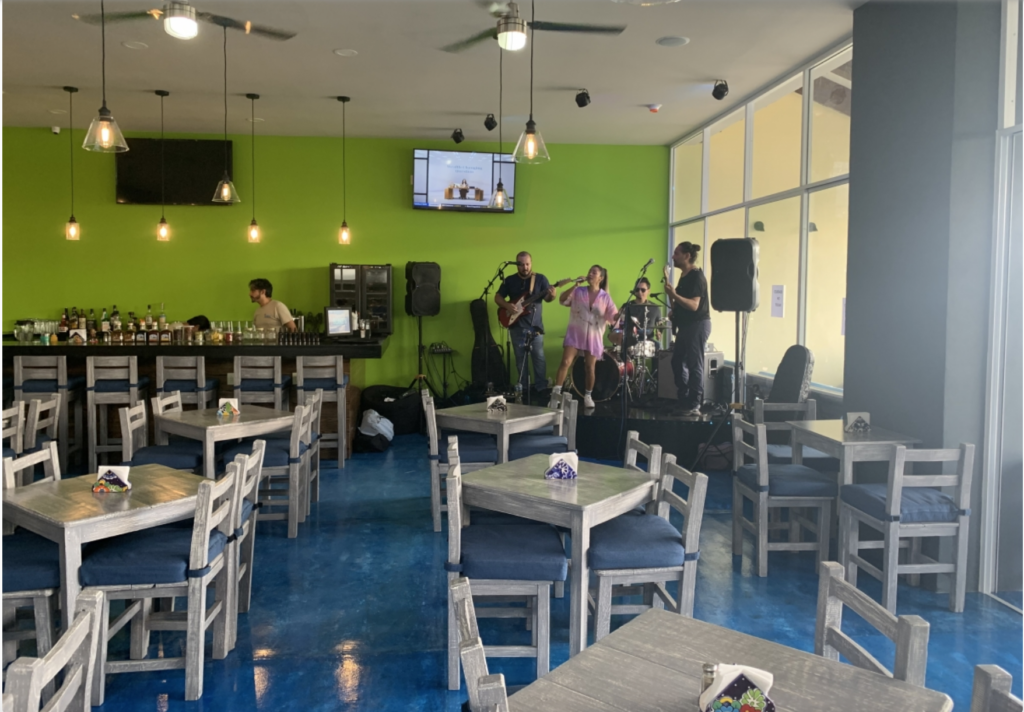Features
Do you want a challenge? Try opening a restaurant in Mexico – four different times in six years

By BERNIE BELLAN In December 2021 Myron Love wrote a story for The Jewish Post & News about former Winnipegger Megan Kravetsky.
How I happened to give Myron that particular assignment was an interesting story in itself. I had begun delivering Meals on Wheels for the Gwen Secter Centre in the summer of 2021 – which, if you can recall, was a period when we were still enduing periodic shutdowns due to Covid. As a result, the Gwen Secter Centre stepped up the number of meals that it began producing – not only for Jewish clients, but for hundreds of non-Jewish clients as well.
I wrote several times about the incredible effort that the staff at Gwen Secter put into producing what ultimately became over 600 meals a week, but that’s not the point of this story. This story is about food though, so there’s a connection.
In any event, beginning in the fall of 2021 I began delivering kosher meals for Gwen Secter on a weekly basis to a number of clients, some of whom some have remained on my list ever since.
One of those clients was a woman by the name of Joanne Field. Like most of my Meals on Wheels clients I developed a nice rapport with Joanne. One day she asked me if I’d be interested in doing a story about her granddaughter, whose name she told me, was Megan Kravetsky. According to Joanne, Megan had been operating a popular restaurant in Puerto Vallarta by the name of Blake’s Bar & Grill, and Joanne thought that readers of the paper who might be heading to Puerto Vallarta that winter would be interested in dropping into Blake’s.
As it turned out, I asked Myron Love to do that story instead of doing it myself because we were coming up to our Chanukah issue at the time and I didn’t have time to talk to Megan and write a story – but I did think that the Chanukah issue presented the perfect opportunity to let readers know about Megan and her restaurant.
That was in December 2021 and, even though my wife and I have been to the Puerto Vallarta area several times – and really love it there, what with Covid putting a crimp in travel plans for several years, it wasn’t until this year that I had the opportunity to head back to Puerto Vallarta. While I was there, I thought, I’d like to touch base with Megan and visit Blake’s myself.
Which is how I came to do a completely different type of story than I expected to write.
You see, Megan Kravetsky’s experiences in Mexico can fill a book – and a good part of that would be a horror story. Try this one on for size: Not only was her business badly affected by Covid in 2020 – just after she had moved into what was then the second location for Blake’s – after having moved from the first location because it was just too small – this past October, after having moved yet again into a different location for Blake’s in what Megan thought was going to be a great location – Hurricane Lidia swept through Puerto Vallarta and Blake’s was forced to close down.
Still, Megan persevered. She had opened another small pop-up restaurant last May called Drop Shot Chill n Grill in an area well known to many Winnipeggers who spend time in Puerto Vallarta, near what is known as the hotel zone. But, in another series of unfortunate circumstances, this time having to do with a very nasty landlady (who repeatedly cut off the electricity to Drop Shot), Megan was forced yet again to close down.
Read on and you’ll find out about the long string of unfortunate events that seem to have accompanied Megan ever since she decided to move to Mexico in 2018, but once you finish reading the story you’re bound to have an immense amount of admiration at how resilient Megan has proven to be.
Here’s some of what Myron wrote in his December 2021 story: “Three years ago, the veteran chef and restaurant consultant came across a deal she couldn’t refuse when she took advantage of an opportunity to buy Blake’s Restaurant and Bar, an established operation in Puerto Vallarta. Megan is now happily living year round in Mexico.
“Now, in truth, the former River Heights kid (Brock Corydon and Grant Park) was no stranger to the Mexican resort community. She notes that her parents, Charles (whose mother is Joanne Field) and Vivian Kravetsky, are long time seasonal residents of the city – spending six months a year there and six months in Winnipeg – and she had visited many times over the years.
“ ‘It was perfect timing,’ she says of her move to Puerto Vallarta.
“ ‘The first year was tough,’ she adds. ‘My Spanish was limited – which made it sometimes difficult to communicate with my staff. Now I am fluent.’
“Kravetsky notes that her original career goal was to become a lawyer (like her father). ‘After five years of university (the University of Manitoba), I realized that that was not what I wanted to do, she recalls.
“Instead, she earned a business degree in management and marketing and went to work in the restaurant industry. She had worked in the restaurant trade part time throughout university. Over the next 15 years, Kravetsky worked successively for the McDonalds chain, Moxie’s, the Olive Garden and Montana Steak House.”
Before I met with Megan on March 16 – at the location of the most recent incarnation of Blake’s Bar & Grill in the port area of Puerto Vallarta known as Puerto Magico, which is where passengers from cruise ships disembark, I had a chance to see for myself the damage that Hurricane Lidia had done to her restaurant. The interior was all covered with tarp, but I was able to see through a hole in the tarp. I was quite surprised to see that the restaurant itself was largely intact – tables and chairs all in place, dishes, utensils and cooking equipment all in place, but the windows to the outside were all blown out. That piqued my curiosity and became the subject of part of our conversation.
Still, as my wife Meachelle and I sat down with Megan to enjoy a beverage in a nearby coffee shop and listen to her story, I couldn’t help but be impressed by Megan’s very positive attitude. As it turns out, Megan had been in my son Jordy’s class at Brock Corydon School (of which I was not aware. Also, somewhat coincidentally, Jordy, who now goes by the name Jitendradas Loveslife, also lives in Mexico, in a town populated by New Age former hippies known as Ajijic.)
I asked Megan how she came to own a restaurant in Puerto Vallarta?
Megan explained that she had gone about as far as she could as a restaurant manger in Winnipeg. As Myron noted, Megan had worked for McDonald’s, Montana’s (helping to open their Kenaston location where she worked as a line cook), Moxie’s Bar & Grill, Olive Garden, also Famous Dave’s – all before she had even turned 30.

Megan had been traveling to Mexico with her parents and siblings for years, she told me, and fell in love with the country. So, in 2018, she took all the savings she had accumulated and bought Blake’s Bar & Grill in downtown Puerto Vallarta, which had first opened in 2006. Before she was able move to Mexico though, Megan had to acquire a residency permit – which was no easy task, she explained.
You see, in order to purchase a business in Mexico, one needs something called an “RFC” (which translates from the Spanish to Federal Taxpayers Number).
As Megan told us, “without that (the RFC) you can’t purchase cars, housing, anything. I got my residency before I moved down. You have to do your residency out of country.”
I asked her how she could become a Mexican resident while still in Canada?
She said, “You apply, you have to make a certain amount of money. So I applied three times – within a six month period. I went to Toronto twice. Applied. Denied. Both times. Went to Calgary” – and finally got her residency permit.
But, there’s something else Megan explained that made the challenge of buying Blake’s even more difficult: She wasn’t able to finance the purchase – she had to pay cash entirely – something, we were also told, is par for the course for just about any major purchase in Mexico, including houses.
But, just because Megan was able to buy Blake’s, she wasn’t able to work in her own restaurant, she told me, until she had a work permit. As she explained, “…so you get one year temporary residency, then you apply for a three year extension after that, and then after that, then you apply for your permanent residency. But temporary residency doesn’t include a work permit. That’s the biggest thing, so I had to apply for my work permit to be attached to my temporary residency.”
Megan, however, had forgotten to apply for a work permit – which she would have needed to work in her own restaurant. “But,” she explained, “then when my daughter was born (in 2019) – because she’s Mexican, I automatically became a permanent resident. So I didn’t have to wait for four years – I only waited two (to become a permanent resident)” – thus allowing her to work in her own restaurant.
Now, while Megan’s initial foray into the restaurant business was quite successful, the first Blake’s Bar was too small to accommodate the high number of customers it was attracting. As Megan put it, “the place was too small. It was a very small… very small restaurant.”
And then, in 2020, Covid hit. While Mexico had no sort of rules requiring masking in public places, it did institute rules governing social distancing – with a six feet distance required between tables. “We could only have two or three tables in at one time during high season,” Megan said.

So, in 2021, Megan moved to another location in Puerto Vallarta, in an area known as Plaza Santa Maria. Things were going really well in that new location. It had become a very popular spot for Canadians, especially Winnipeggers, as Megan made sure all Winnipeg Jets games were shown there. (Megan was in that location when Myron contacted her and she was brimming with confidence when she spoke to him about how well things were going.)
There was one major problem, however, as Megan explained: “The landowner there didn’t pay her taxes. So when you went to go take out your licensing, you have to show proof the taxes are. And if they’re not paid, then you can’t take out your licensing. And she owed back taxes of almost five years, which was over 300,000” (pesos – or about $22,000 Canadian dollars).
“And she didn’t want to pay it. So I had no choice,” Megan noted. As a result, after only one year in what had been a very successful location – even if only for a short while, Megan moved yet again, in 2022 – this time to the Puerto Magico location.

The owners of the building where Megan opened what by then had become the third location for Blake’s in only four years had induced her to move there with all sorts of promises, she said: “They had promised us numerous things that they never completed. The passport office was supposed to open upstairs two years ago. Still not open. Another restaurant was supposed to be up there. We were just alone up there. There’s nothing. They made it impossible for guests to get up the stairs. They wouldn’t fix the elevator. It still doesn’t work to this day. It’s been three years…and the whole thing with that is they don’t want to pay the electricity to have the elevator working.
“So they just made it impossible for the cruise ship people to get upstairs or any people in general to get upstairs.” On top of all that, the owners of Puerto Magico didn’t allow Megan to have any signage on the street which would have told tourists that Blake’s Bar was there.
Still, Megan might have been able to turn things around were it not for that hurricane last October. She had developed a great reputation as a restaurateur. (Just take a look at the glowing reviews on Tripadvisor for Blake’s Bar). In addition, Megan is a fantastic baker and she had opened a bakery known called Sweet Temptations Bakery Boutique next door to Blake’s in Puerto Magico. That closed too the same time as Blake’s when the hurricane hit.
You’d think, however, that notwithstanding the damage that a hurricane might have caused, it would just be a matter of time before things could have been repaired and Blake’s would have been back in business – but that wasn’t the case.
While the interior of the restaurant was left largely intact, the windows had all been blown out. So, it’s just a matter of replacing the windows – right? Or, so you’d think. But this is Mexico – and similar to the landlady who didn’t want to pay her taxes in Blake’s previous location, the owners of Puerto Magico haven’t moved to replace the windows that were blown out.
Here’s how Megan described what happened: “So, the whole thing here, after the hurricane hit, when you construct a building here, the windows and doors are property of the plaza. Doesn’t matter if you put them in, they put them in, it’s property of the plaza. You can’t leave with them. Yeah. Same with the floor. So when the hurricane came through and destroyed everything, the first thing they said to me is our insurance will cover it, our insurance is going to cover it, it’s our property.
“So we waited and waited and waited and waited and about two and a half to three months in, they said, nah, our insurance actually isn’t going to cover it. At that point, my own insurance wouldn’t cover it anymore. It has to be done within 24 hours. That’s just how it is.” (Note to readers: Anyone from Winnipeg could identify with Megan. A building burns down and a pile of rubble remains for years. A bridge closes because it’s unsafe and it sits there – unusable, but with no plan to replace it.)
Not one to let anything get her down though, Megan still had her pop-up restaurant, Drop Shot Chill n Grill. As I mentioned at the beginning of this story though, just recently that site too had to close down.
This time it was the landlady who owned the area where Drop Shot was located that forced Megan to close. While Megan leased the space for her location from an individual who didn’t actually own the land where Drop Shot was situated, he had tennis and pickleball courts there. Apparently though, the woman who actually owned the land didn’t like the loud music coming from Drop Shot – even though it wasn’t in a residential area at all.
Again, here’s how Megan described the situation: “In our contract it stated that I was allowed to have live music, barbecue, blah, blah, blah. The landowner who owns the land, who I don’t lease from, owns the hotel behind the parking where the tennis courts are. And she doesn’t like noise. She doesn’t like any noise. Yet, they have music and tennis tournaments and fairs and they have the food park and all that.
“So, during our live music, she would complain constantly, even though our music was only from 3 to 6 – that her guests, one guest in particular, couldn’t sleep – it was too loud. We always abided by the decibel restriction limit; it was never over the decibel limit.”
The story continued: “So she cut our electricity off once when we had the live music – but the second time she did it, I had a generator. She didn’t know that I had a generator going. So she had cut the electricity, but the music was still playing. So at that point she would call the ‘reglamentals’ – the bylaw officers, who would come check and she’d say, ‘There’s really loud music going on at Drop Shot.’ They would come, they would check, they’d check my permits, everything would be okay, they’d leave. That’s when I called the police on her. They’re my friends. They had a very long conversation with her… told her that it’s illegal to cut the electricity, she can’t do it.”
But, as you might expect, the landlady wasn’t about to back down. “It got to the point where she threatened the guy who I was subleasing from that if he didn’t get rid of me, she was going to get rid of everybody.
“She wouldn’t re sign the contract with him. So he’s had his tennis courts and pickleball courts there for over five years. And she said, ‘if I don’t leave, then everybody’s leaving.’ “
So, once again, Megan has had to abandon what had turned into a successful venture – but after dealing with Covid, a landlady who didn’t want to pay taxes, a hurricane, and a landlady who doesn’t like loud music, you’d have to wonder whether Megan is still willing to enter into yet another food venture?
Not surprisingly, she said she is. I asked her “How real is that? How feasible or viable?”
“Oh, it’s very viable,” she answered. “We’re just waiting on the contract to be signed.” Megan added that she has someone who she wouldn’t describe as a partner in her putative venture, but somebody “that’s going to help me.”
Throughout our conversation I had refrained from bringing up the subject that surely must be in the back of many a reader’s mind when it comes to thinking about doing business in Mexico: What about the cartels? Has Megan had any run-ins with the local cartel I wondered? (And when it comes to cartels, Puerto Vallarta is located in the state of Jalisco. Anyone who knows anything about Mexican cartels would know that the Jalisco cartel has a reputation for extreme violence.)
Megan answered though that “They’re not really that visible here… They keep it very under the table here.”
I said though that “the Jalisco cartel is notorious.”
But, Megan responded, “that’s more towards Sinaloa and Chihuahua.”
Still, given Mexico’s longstanding reputation for corruption at almost every level, I asked Megan, “Did you have to pay off people?”
She answered: No, never, never, never had to pay anybody off. You give back and then, you know, everybody takes care of each other.” She went on to describe the excellent rapport she has had with the local police, for whom she has catered a huge feast known as a “masada” every year, at which over 400 police have attended.
It’s hard to imagine someone coming down to Mexico and, within the space of only six years, opening restaurants (and closing them) in four different locations, yet still remaining optimistic that she’ll be able to open a fifth in short order.
If and when Megan does open another restaurant – I’d sure like to try the food. If the reviews she received on Tripadvisor for each of her locations are any indication, one thing Megan Kravetsky knows is how to prepare great food – and leave her customers with a thoroughly enjoyable experience.
Features
What Does The Future of Online Betting Look Like For Canadians?

There have been plenty of positive developments recently in how Canadians can place bets online. A major boost to the Canadian online gambling industry came when Ontario opened its doors to private companies. What further changes lie ahead in the future?
The expansion in Ontario has produced massive revenues for the Canadian gambling industry. Allowing private companies to operate in the province has given gamblers far more choice and they have been flocking to the new sites now available. Great news of course for gamblers and betting companies but also for the taxman. As has been seen in the USA, making gambling legal (especially on sport) has brought in billions of dollars of tax revenue. Canada is now also reaping the benefits and will continue to do so in the future.
The industry was also changed when in 2021 it finally became possible to place single-event bets on sport. Until then it had to be parlays or as they’re also known, accumulators. Both of these changes have seen a great improvement in the online Canadian gambling industry. 2024 has already been a profitable year for the online betting industry in Canada. The first quarter of the 2024-2025 fiscal year certainly illustrated that. The total amount wagered was $18.4 billion and that was 31% higher than the results for the same period in the previous fiscal year.
Revenue in Ontario for the period April 1 to June 30 was $726 million. That’s from the 50 operators who have 80 gaming sites in the province. The total is 34% higher than in the same period in 2023 and 5.2% higher than the previous quarter. With the expansion in Ontario being so successful, the question now is whether other provinces will follow suit. It seems that opening up their gambling industry to private operators may well be the way forward. However, it is recognised that if this is to happen, it must be done safely. Wherever there is legal online betting, it seems that regulation is not too far away. It’s accepted that there is the need for some regulation. Protecting players is vital and with companies required to be licensed, this helps control them. Those who bet at unlicensed sites do not have anywhere near the same level of customer protection and are at risk of online fraud.
There have already been signs of increased regulation of the Canadian online betting industry. How gambling is advertised is always a thorny subject whatever the country. This year has seen the use of celebrities or sports stars in gambling related advertisements prohibited. A key reason for this is to protect youngsters who may be attracted to the industry. Studies have shown that youngsters can identify gambling brands more than they do those for tobacco or alcohol.
It’s also likely that there will be more betting on esports in the future. There has been an increase in the amount of coverage given to them by online betting sites. This was particularly seen during the COVID-19 pandemic when many sports events were canceled. Esports continued and sites such as PowerPlay began to give them increased levels of coverage and will continue to do so.
Technology plays an important role in the gambling industry. Those who love to go online and place bets will see technology producing even more changes in the future.
Banking is an important element of online betting. Improvements in technology in this area have made it far easier to place bets online. Improved encrypting of data and more use of cryptocurrencies also makes it safer when it comes to online financial transactions. Again, this will attract even more gamblers to the industry.
As for the games that are played, particularly when it comes to online casinos, huge strides are taking place. Virtual Reality (VR) and Augmented Reality (AR) are the way ahead, so expect to see more Canadian gamblers wearing VR headsets as time goes by.
The graphics seen in games are already staggering but they will get even better in the future. Putting on your VR headset will see players transported into other worlds and even forwards or backwards in time. Those who love to play at live casinos will be in for a treat. Using their headset, it can appear they are playing at one of the most famous casinos in the world, rather than on their settee.
AI is loved by many but hated by some. It will also have a huge influence on the Canadian online betting industry in the future. This won’t just be in creating games but also be used to deal with customers. AI has the ability to gauge the behavior of gamblers and identify if there is a possible need to help them if spending too much or betting for too long.
Mobile phone technology continues to make advancements. Rather than just playing on your laptop at home, many players download apps and try their luck on their mobile devices. Further advancements are fully expected in the future.
The future of online betting in Canada does look a rosy one. The amount earned by betting companies is expected to increase and that will be good news for those who receive tax revenue. Players will likely have more sites to bet on if other provinces follow in the footsteps of Ontario. The games that will be available will be even more thrilling to play and becoming a member of a site will be safer.
Features
New book chronicles what were arguably the most important – and controversial Olympic Games in history

Review by BERNIE BELLAN With the 33rd Summer Olympics set to take place in Paris from July 26 to August 11, I thought it an opportune time to tell readers about a book that was released earlier this year and which provides a sweeping view of what were arguably the most controversial Olympic Games ever held – the 1936 Summer Olympics in Berlin, Germany.
Written by two writers, Glenn Allen and Richard Kaufman, who have spent most of their careers writing and producing films, PLAYED: The Games of the 1936 Berlin Olympics combines fiction and non-fiction in a thrilling, yet somewhat confusing manner.
Although Jewish readers are likely to find themselves focused on the rampant antisemitism that pervaded the games – given the determination of Hitler to use the Olympic Games as a masterful propaganda tool, this book is sure to appeal both to fans of the Olympic Games and students of history.
There are many heroes mentioned throughout “PLAYED,” including such well known names as Jesse Owens, who embarrassed Hitler to no end by winning what was then a record four Gold medals in various track events. But there were many other heroes as well, especially Alan Gould, who was the Associated Press Sports Editor, and who wrote many columns calling for a boycott of the games; and William Dodd, the US Ambassador to Germany from 1932-1937, who was warning of the dangers posed by the Nazi threat long before it became all too apparent to politicians, including President Franklin Roosevelt – who adopts quite a sanguine attitude toward the Nazi threat in this book.
And then there are the villains, chief among whom was the despicable Avery Brundage, President of the American Olympic Committee, who was determined to be appointed to the International Olympic Committee (of which he was later to become its president, from 1952-72). It is no coincidence that it was Brundage who was not only the key figure in overcoming resistance to the notion of the US boycotting the 1936 games, it was Brundage who was also central to the 1972 Munich Olympics carrying on even after the massacre of 11 Israeli athletes.
I admit that I knew quite a bit about Brundage’s unsavoury reputation even before reading this book, but the degree to which he connived to make sure America would be represented at the games when there was fierce opposition to exactly that position from many of the leading figures in the sports world in the US at the time is truly shocking.
But, while the historical record provides ample evidence of the extent to which Hitler and his henchmen were determined to use the Olympics as a showcase for Nazi superiority, while reading this book I couldn’t help but wonder just how much fiction was mixed with fact.
In the press release I was sent about the book, it was noted that “Based on real stories and real people involved in the 1936 Berlin Olympics, PLAYED plunges readers into a compelling, fictionalized account of the insanity and hysteria that unfolded across Germany, the United States and in much of the world from 1931 through 1936.”
I couldn’t help myself from questioning: Just how much is fact and how much is fiction in this book? Of course, given that the authors use their imaginations to conjure up the dialogue in the book, I kept thinking to myself – especially as I was reading about how sexually aggressive many of the female characters in this book were: Is this a case of two screenwriters using their past experiences writing movie scripts as an excuse to infuse something that might be passed off as a largely historical account with a great big dollop of licentiousness in order to attract readers?
Two of the major female characters: Martha Dodd, daughter of US Ambassador Dodd, and Eleanor Holm, a champion US swimmer, certainly led carefree sex lives – at least if you were to believe the accounts given in this book. Dodd, in particular, is such a fascinating character, because not only was she quite willing to go to bed with many Nazis (and it seemed – anyone who asked her), including Ernst “Putzi” Hanfstatengel, described as Hitler’s henchman – who would eagerly dispatch anyone Hitler wanted rid of, in time Martha Dodd ended up in the arms of a Russian spy – who himself was ordered executed by Stalin.
As for Holm, even though she was a champion in the swimming pool (in backstroke events), she hardly led a disciplined life as an athlete. In PLAYED, at least, she is one hell of a “player” – and this was well after she was married!
Unfortunately for Holm, however, one man who lusted after her – and whom she detested, was Avery Brundage. Now, I did try to find out whether the account given by Kaufman and Allen of what happened between Holm and Brundage when they were both on the same ship headed to the Berlin Olympics with the entire American team of athletes and officials, was in any way true. (In the book, Brundage attempts to rape Holm, but given her athleticism, she manages to deliver a solid kick to his nether regions – leaving him writhing in pain. The next day, he decides to kick her off the US Olympic team.) According to Holm’s own account, however, the reasons for her being booted off the team had to do with her not wanting to go to bed when she was told to do so. (I much prefer the PLAYED version – and if they ever make a movie from the book, I’m sure audiences would be much more interested in watching Holm do to Avery Brundage what a lot of women would probably fantasize about doing to men.)
Of course, the parts of the book describing some of the leading Nazis, including Hitler himself, along with Joseph Goebbels and Herman Goering, are luridly detailed – as one would expect any description of them to be, but one character who comes off quite favourably – much to my shock, is Leni Riefenstahl, the famed German filmmaker, who had already established a notorious reputation as a propagandist in her famous documentary about the 1934 Nuremburg Rally, “Triump of the Will.”
Rather than painting her as a tool of the Nazis though, the authors offer quite a sympathetic – even admiring portrait of someone who was wedded to her craft. According to this book, Riefenstahl actually fell in love with a member of the US Olympic team by the name of Glenn Morris, who goes on to win Gold in the decathlon competition. (Again, however, there is one unforgettable scene where Morris, after winning his medal, runs over to Riefenstahl, rips off her blouse, and kisses her breast. Is this a Hollywood screenwriter’s fantasy? Who knows?)
There are also many stories of Jewish athletes in this book – some of which are tragic. The female high jump champion in Germany at the time was someone by the name of Gretel Bergmann. Bergmann had gone to England prior to the Olympics knowing full well that she would not be allowed to compete for Nazi Germany. In the book, Putzi goes over to England and threatens Bergmann that she will have to return to compete for Germany, otherwise her family – who had still remained in Germany, will face severe consequences. When Bergmann reluctantly returns to Germany, Brundage points to her becoming part of the German Olympic team as a sign that the Nazis have softened their stance toward Jews, but once the American do agree to participate and cross the ocean to Germany, Bergmann develops a mysterious “injury” that prevents her from actually being part of the German team.
The book is full of such stories – so many, in fact, that your head will be spinning trying to keep track of all the characters mentioned in the book.
Still, if you want to enjoy a rollicking read that may or may not have many parts that are wholly concocted from the writers’ imaginations even though they’re writing about actual events, then you might want to give PLAYED a shot.
As for this year’s version of the Olympics, while there isn’t nearly the same dramatic tension surrounding them as there was prior to and during the 1936 Berlin Olympics, the cheating, skullduggery, and propaganda that permeated the 1936 games has forever tarnished the reputation of the Olympic Games and, while it’s a different type of antisemitism that we’re seeing on the world stage these days, we’re all holding our collective breaths wondering how Israeli athletes are going to be treated in Paris – the same way Jews were wondering how Jewish athletes were going to be treated in Nazi Germany in 1936.
PLAYED: The Games of the 1936 Berlin Olympics
Published 2024 by WordServe Publishing
419 pages
Features
Canada’s favorite online casino games

The people of Canada sure love to play casino games. Gaming and placing bets is a popular pastime in the country with 76 percent reporting that they have participated in at least one form of gambling within the last year. In recent years, the online industry has seen a significant boost as players look to play at the best Canadian online casinos as more provinces look to remove prohibitive legislation.
We take a deep dive into the current legal situation for both online and offline casino gaming in the country, in addition to which casino games are the most popular and what there is to love about them, as well as what the future of the Canada’s online casino landscape could look like.
Both online and offline casino gaming is popular. When playing games online, players look for convenience, security and a good variety in bet and game choices. When going to a land-based gambling venue, they look for a comprehensive entertainment experience, they expect a trip to a casino to be an exciting day out.
The laws in Canada are complex in regards to what types of gambling are legalized and how it is regulated.
The lowdown on gambling laws in Canada – online and offline
Under federal law in Canada, technically the provision of all gambling related services is prohibited. However, exceptions are applied when it is regulated at a local or provincial level.
Each province has the responsibility of regulating and creating laws that concern all types of gambling within them. If they chose to do so then they can provide licenses, manage revenue distribution and set their own age restrictions. Most provinces in Canada have now legalized gambling in some form, with some areas having a more prohibitive approach than others.
For example, Ontario is probably the least restrictive and there are a number of land based casinos venues here open to residents and tourists. Also, there has been a recent introduction of iGaming in the province too.
There are now more provinces looking to follow in Ontario’s footsteps with Alberta looking at taking a less restrictive stance. Currently, charities and religious organizations are allowed to register as gambling providers. There is also an online gambling site based in Alberta that is regulated.
In Canada, the Criminal Code does not actually make specific reference to online gambling activity, which has left it open somewhat to interpretation. The federal government itself has not created any laws specific to online casinos, some provinces are now establishing their own regulations. Also, online casinos and other gambling sites that are operated outside of the country are accessible to people within Canada.
There are a few casino games that are particularly popular in Canada
Slots
From electronic machines to table games, Canadian’s love all types of casino activities. Slots and online slots are one of the top games enjoyed in the country. One reason that people love slots is due to their simplicity, there are no complex rules to get to grips with.
Online games and offline slots are very similar, however online games tend to have more special features and bonus rounds. You might also find that the minimum bet amounts are lower. Slots come in all kinds of themes, from movie themed games to those inspired by ancient Egypt and the pharaohs, there are thousands to choose from online.
Poker
Another well-loved casino game in Canada is poker, a game that has been around for hundreds of years and can also be played online. Poker is a bit more complex and requires patience in order to develop the necessary skills and strategy to be confident when playing the game.
Texas Hold’em is the most common variant of the game in this region, although three card poker, omaha and seven card stud are just some examples of the other types of poker enjoyed here.
Roulette
Roulette is also a top game for Canadian casino enthusiasts. The three main variants are American, European and French, with the American roulette game being the most widely recognized across Canada. Each variation has a slightly different format and house edge as well as different betting options.
Blackjack
Blackjack, also known here as 21, is a top card game. The player is playing against the dealer and to win they must try to get to 21, or as close as possible, before the dealer does.
The future of online casinos in Canada
As casino related legalization across Canada becomes less restrictive and more online operators set up in the region, we can expect this industry to flourish in the years ahead. Player numbers are likely to continue to grow and new technologies like AI will further improve and personalize the experiences users have on gaming sites.




You must be logged in to post a comment Login